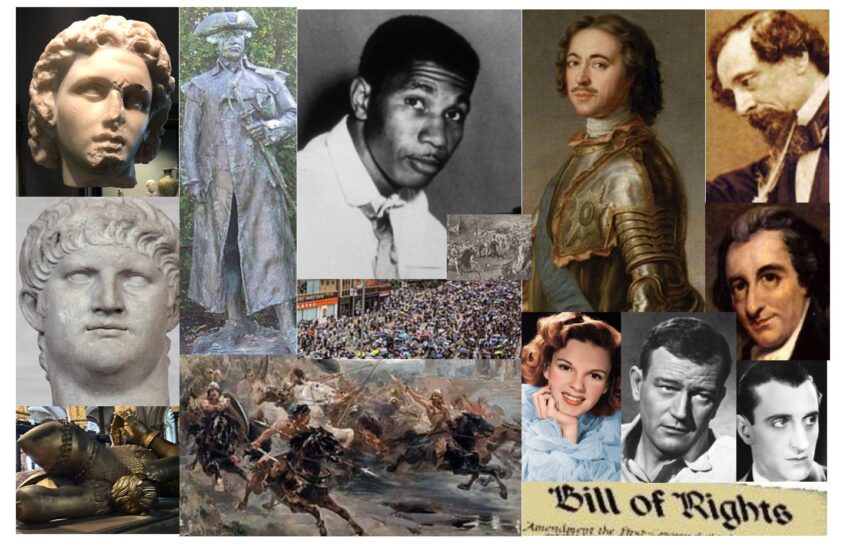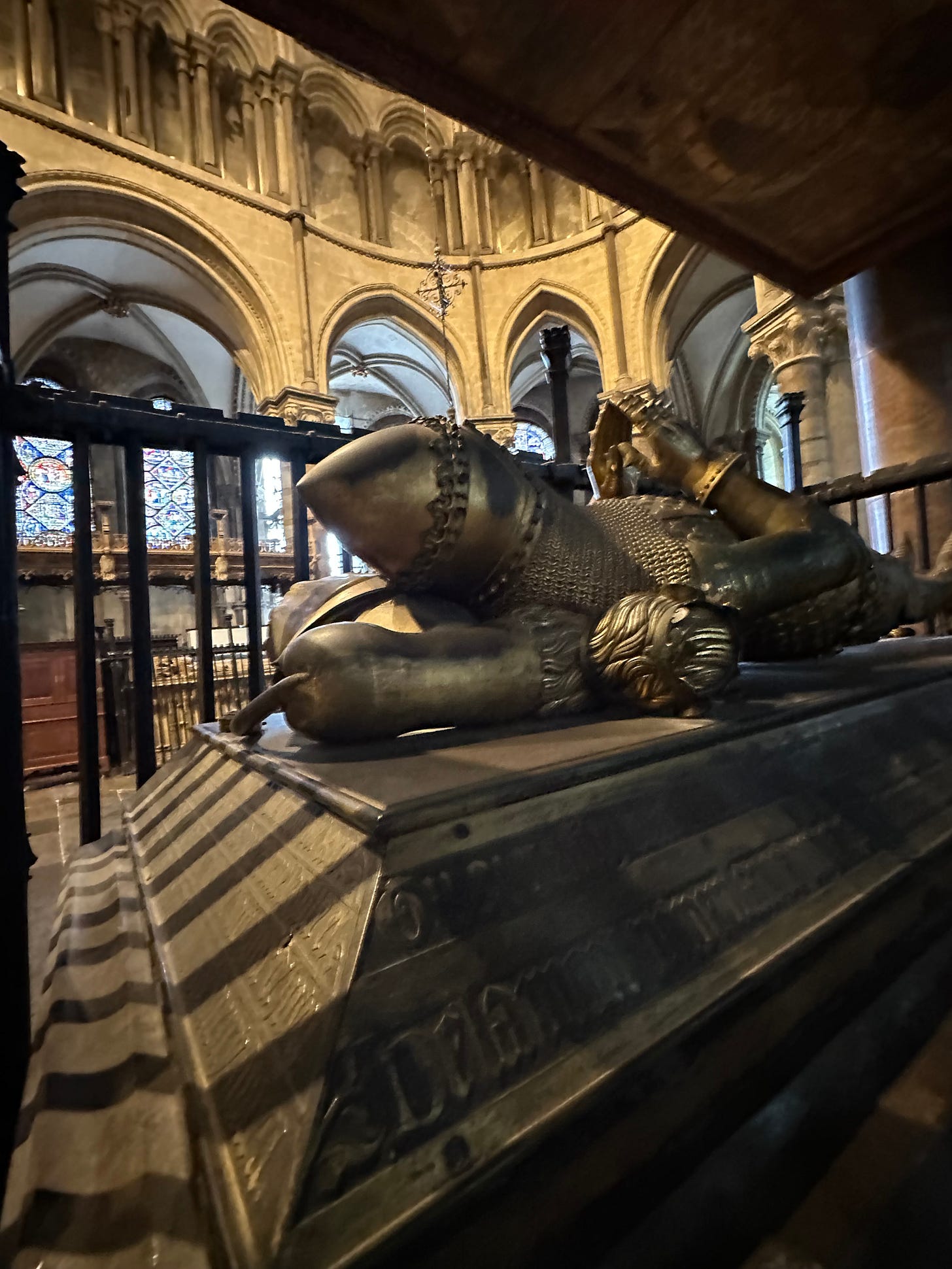“The study of History is the beginning of political wisdom.” —Jean Bodin
June 8
452 – Reportedly the date on which Attila the Hun invaded Italy.
793 – Vikings come and plunder the great English monastery of Lindisfarne, home to the relics of St. Cuthbert. An Anglo-Saxon chronicle notes that “heathen men came and miserably destroyed God’s church on Lindisfarne, with plunder and slaughter.”
1191 – During the Third Crusade, King Richard I of England, famously known as Richard the Lionheart, arrives at the port of Acre in the Holy Land to join the crusaders fighting the Muslims in the Siege of Acre.
1376 – Edward the “Black Prince” of England, a key figure in the Hundred Years’ War between England and France, dies. “His military prowess and chivalric reputation made him an exemplar of medieval knighthood, embodying both the virtues and the violence of his era.” His tomb in Canterbury Cathedral, next to the spot where the shrine of Thomas a Becket once stood, remains a place of historic interest today (see below).
1783 – The Laki volcanic eruption in Iceland kills over 9,000 people. The ensuing famine then killed about 20,000; in all, one-third of Iceland’s population perished.
1789 – “[Constitution Center] James Madison addressed the House of Representatives and introduced a proposed Bill of Rights to the Constitution. More than three months later, Congress would finally agree on a final list of Rights to present to the states.” Madison’s proposed Bill of Rights was based on the Bill that Founder George Mason had proposed years earlier. While not all of Madison’s original proposals made it onto the final Bill of Rights, among those that did are such key rights as free speech, keeping and bearing arms, speedy trials, and religious freedom.
1809 – Thomas Paine, the writer whose work “American Crisis” saved the American Revolutionary cause during a period of near-despair, dies.
1810 – Romantic-era classical German composer Robert Schumann is born. His wife, Clara, was also a composer.
1845 – Andrew Jackson dies. A military hero of the War of 1812, he went on to become the first Democrat president, partly—or largely—by lying and deception. Among his egregious and unconstitutional acts was the Indian Removal Act, which resulted in the deaths of some 4,000 natives. As a corrupt, racist, anti-constitutional liar, Jackson set the tone for over 200 years of Democrat leadership.
1867 – Famous U.S. architect Frank Lloyd Wright is born.
1966 – U.S. pilot Joseph A. Walker, the first pilot to fly an airplane into space, is killed in an airplane collision.
June 9
68 AD – Roman Emperor Nero dies, having asked his servant to assist him in committing suicide as the Roman Senate had passed sentence on him. Nero, who had fancied himself a great actor, musician, and composer, spoke his last words: “What an artist dies in me.” For most of history he was believed to have deliberately started the fire that devastated Rome, and he did falsely blame the Christians for it, launching a bloody persecution of them. Nero was undoubtedly a vicious, brutal, murderous, lecherous, perverted, selfish, corrupt, crazy individual—a terrible friend and a deadly enemy. Among the saints martyred under Nero were Peter and Paul the Apostles. Below is actor Peter Ustinov’s brilliant portrayal of Nero in the movie Quo Vadis.
721 – Aquitanian Christian troops under Duke Odo defeat an Umayyad army and decisively halt Muslim expansion into Europe at the Battle of Toulouse.
1672 – Tsar Peter “the Great” of Russia is born, famous for the “reforms”, secularizations, and changes he made to politics, education, the military, and religion in Russia.
1781 – Engineer George Stephenson, “father of the railways,” is born in England.
1815 – The Final Act of the post-Napoleonic wars Congress of Vienna is signed, shifting territorial boundaries and setting a standard for European politics that would continue with some changes until WWI.
1870 – British novelist Charles Dickens dies. His novels are among the most popular and influential works in the English language, including Oliver Twist, A Tale of Two Cities, Our Mutual Friend (my personal favorite), David Copperfield, Little Dorrit, Pickwick Papers, and Great Expectations. His Christmas novel A Christmas Carol so shaped the modern celebration of that holiday that he has been called “The Man Who Invented Christmas.”
1891 – Hugely popular and influential American songwriter Cole Porter is born. His songs include “Don’t Fence Me In,” “I’ve Got You Under My Skin,” “True Love,” “Night and Day,” and “You’re the Top.”
1963 – Eccentric award-winning actor Johnny Depp is born in Kentucky.
2019 – An estimated 1 million Hong Kongers protest dictatorial new Chinese Communist Party (CCP) legislation, including extradition of prisoners from Hong Kong to mainland China. The CCP harshly cracked down on the protests.
June 10
323 BC – Estimated date on which Alexander the Great dies at age 32. The king of Macedonia and a pupil of Aristotle, the young Alexander conquered much of the known world in astoundingly rapid and effective campaigns. Even during his life, Alexander claimed demigod status, and he has figured prominently in both history and legend ever since his death.
1190 – In a disaster for the Third Crusade, Holy Roman Emperor Frederick I Barbarossa drowns in the River Saleph while leading his army toward Jerusalem.
1786 – A landslide and dam breach triggered by an earthquake on China’s Dadu River kill an estimated 100,000 people.
1895 – Hattie McDaniel, the first black actress to win an Academy Award, is born in Kansas.
1898 – U.S. Marines land in Cuba at Guantanamo during the Spanish-American War.
1916 – The Great Arab Revolt begins against Ottoman Turkish rule.
1922 – Iconic American actress Frances Gumm, better known as “Judy Garland,” is born.
2003 – U.S. launches the Spirit Rover, the start of NASA’s Mars Exploration Rover mission.
June 11
1184 BC – Greek mathematician Eratosthenes believed this was the date of the brutal Greek sack of Troy (another proposed date is April 24). Having pretended to depart Troy leaving behind a large wooden horse, the Greeks led by the underhanded and vicious Odysseus came out of the Horse at night and set to slaughtering the Trojans wholesale (including the children), excepting the women they took as sex slaves. For an historical-mythical account of the Trojan Horse and the Sack of Troy, see Vergil’s Aeneid, Book II.
1572 – Estimated date of the birth of English dramatist, poet, and critic Ben Jonson.
1741 – Dr. Joseph Warren is born. Besides being a skilled surgeon, he was one of the most fiery and influential members of the Sons of Liberty. Warren sent Paul Revere on his famous midnight ride and led militia harassing British troops on the day of the Battles of Lexington and Concord, the first engagement of the Revolution. “Where danger is, dear mother, there must your son be. Now is no time for any of American’s children to shrink from any hazard. I will set her free or die,” Warren declared. Sadly, he did die soon after, being shot by a British officer at the Battle of Bunker Hill. The British stripped and repeatedly stabbed Warren’s corpse. British Gen. Thomas Gage admitted of Warren that his death was “worth the death of 500 men.”
1776 – The Second Continental Congress forms a committee of five delegates to write a draft of the Declaration of Independence. The delegates were John Adams from Massachusetts, Benjamin Franklin from Pennsylvania, Roger Sherman from Connecticut, Robert R. Livingston from New York, and young Thomas Jefferson from Virginia.
1910 – French explorer, filmmaker, and oceanographer Jacques Cousteau is born (his ship was the Calypso).
1959 – English comedic actor Hugh Laurie is born.
1962 – Robbers Frank Morris and the Anglin brothers successfully escape fromthe hitherto escape-proof prison on Alcatraz Island. The prison was closed less than a year later.
1979 – Iconic American actor John Wayne, “the Duke,” dies.
1987 – Conservative UK PM Margaret Thatcher becomes the first in over 160 years to win three consecutive terms in office.
2014 – The Fall of Mosul, as Islamic State jihadis seize control of the Iraqi city. Disastrous for many inhabitants, especially Christians.
June 12
1864 – End of the Battle at Trevilian Station, the biggest all-cavalry battle of the U.S. Civil War. While Union troops under Gen. Sheridan did manage to capture some Confederate supplies and tear up a few miles of rails, but while they succeeded in distracting the Confederates from U.S. Grant’s movements, ultimately and unfortunately there was no long-term disruption of Confederate supply lines. The battle did include what is called “Custer’s First Last Stand,” as Union Gen. George Custer and his men were surrounded by Confederates while capturing supplies. Sheridan fortunately arrived to save them.
1918 – WWI: “The 96th Aero Squadron bombs the Dommary-Baroncourt railway yards in France in the first daylight bombing raid carried out by the AEF [American Expeditionary Force].”
1942 – Anne Frank receives a diary as a 13th birthday present. Now famous as she recorded her experiences hiding from Nazis in it before she became a victim of the Holocaust.
1944 – Pope Pius XII meets with Irish troops who helped liberate Rome during WWII. Read my full article for more details.
1963 – Mississippi NAACP field secretary Medgar Evers is assassinated by a member of the terrorist KKK. WWII soldier, civil rights champion, and family man, Evers’s heroism inspired many others to fight racism and segregation. As he said, “You can kill a man, but you can’t kill an idea.”
1964 – South African activist and founder of the sabotage movement Nelson Mandela sentenced to life imprisonment.
1981 – Iconic film “Raiders of the Lost Ark,” first in the Indiana Jones movie series, premieres.
June 13
1774 – “Rhode Island became the first [American] colony to ban the importation of slaves.”
1866 – The 14th Amendment passes Congress. It would give freedom and civil rights to slaves. “All persons born or naturalized in the United States, and subject to the jurisdiction thereof, are citizens of the United States and of the State wherein they reside.” While Abraham Lincoln did not live to see the Amendment passed, he had worked hard to further it.
1892 – British actor Basil Rathbone, most famous for his portrayal of Sherlock Holmes, is born.
1956 – Reported date on which the last British troops leave the Egyptian Suez Canal.
Did I miss any important events? Let me know in the comments.
Click this link for the original source of this article.
Author: Catherine Salgado
This content is courtesy of, and owned and copyrighted by, https://catherinesalgado.substack.com and its author. This content is made available by use of the public RSS feed offered by the host site and is used for educational purposes only. If you are the author or represent the host site and would like this content removed now and in the future, please contact USSANews.com using the email address in the Contact page found in the website menu.









